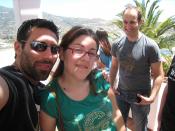Wright 1
Jeffery L. Wright
Humanities 540
Professor Bryan Feuer
09 March 2005
POVERTY AND CULTURE
The Greek cities that developed at the beginning of the archaic period were known as polis. Each of these polis, or cities was comprised of a collection of poor self governing people. The polis was a form of two cities. There was a lower city, in which the people lived, and a high city, or acropolis, an elevated place in the center of the city. Usually the acropolis is where you would find the temple of the gods. The Greek polis emerged as a relatively peaceful, quite place to live. In its formative period, poverty proved to be an advantage rather than a disadvantage to each polis, or city.
Poverty has many obvious disadvantages, but in the context of ancient Greece it contributed to the growth of a culture and political system unlike any other.
For example, each polis lacked large distinctions between the rich and the poor. To this end, kings and priests could not rise to power and prominence, and Greeks were forced to develop different, more democratic systems of government. Occasionally a polis might have a king but typically power in the polis actually belongs to the landowners and tribal leaders. Culturally the Greek polis, absent of an abundance of food and materialistic consumption, had plenty of surplus time. As a result, polis citizens had plenty of time for intellectual reflection; they were free to pamper themselves in endless conversations and philosophize on the state of man, and esthetic indulges sexual passions.
Additionally, Lewis Mumford states in The City IN History that, most polis inhabitants were poor and use to living a lean life on barley and wheat. As a result, polis citizens could not be bribed by bread and shows.


